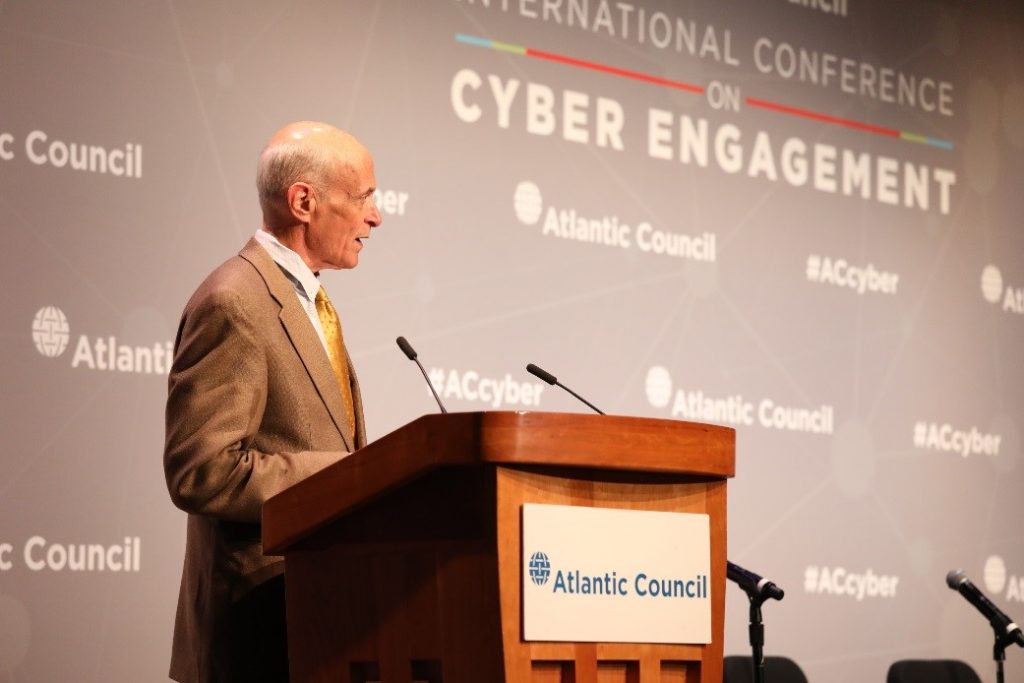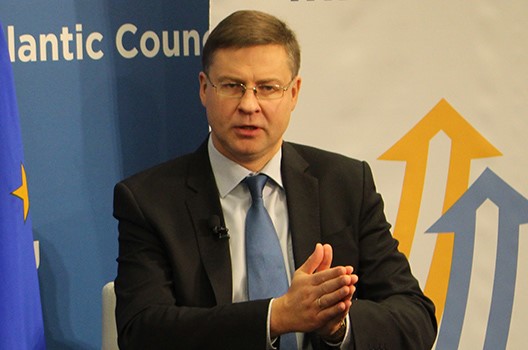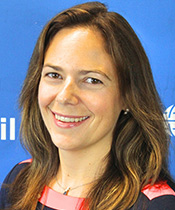SCOWCROFT CENTER FOR STRATEGY AND SECURITY
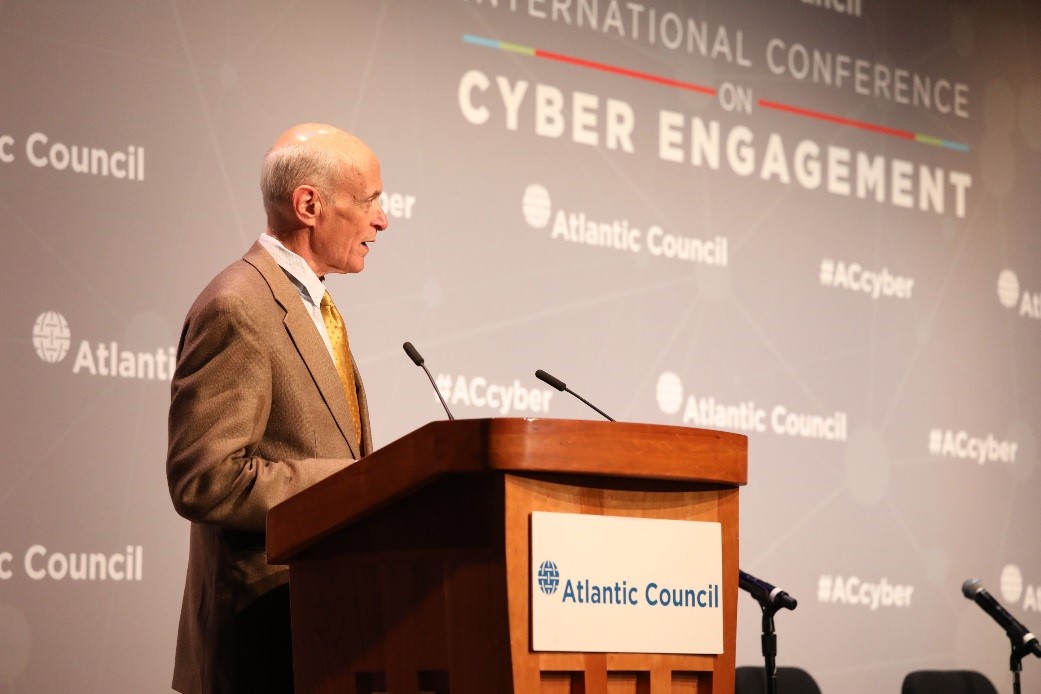
On April 23, the Scowcroft Center for Strategy and Security hosted the International Conference on Cyber Engagement in conjunction with Dentons, PKO Bank Polski, and Texas A&M University. The conference featured 600 participants from over sixty countries for one day of panels and keynotes on some of the world’s most pressing cyber issues, such as 5G, the Internet of Things, artificial intelligence, and diplomatic and military perspectives on cyberspace. The conference was a truly international event featuring over sixty diverse speakers, including speakers from both China and Taiwan.
A VIP dinner held the evening before for sponsors and speakers featured keynotes by the Hon. John Demers, Assistant Attorney General for National Security, US Department of Justice, and H.E. Tobias Feakin, Ambassador for Cyber Affairs, Australian Department of Foreign Affairs and Trade.
Korea Journalist Fellowship Seoul Trip
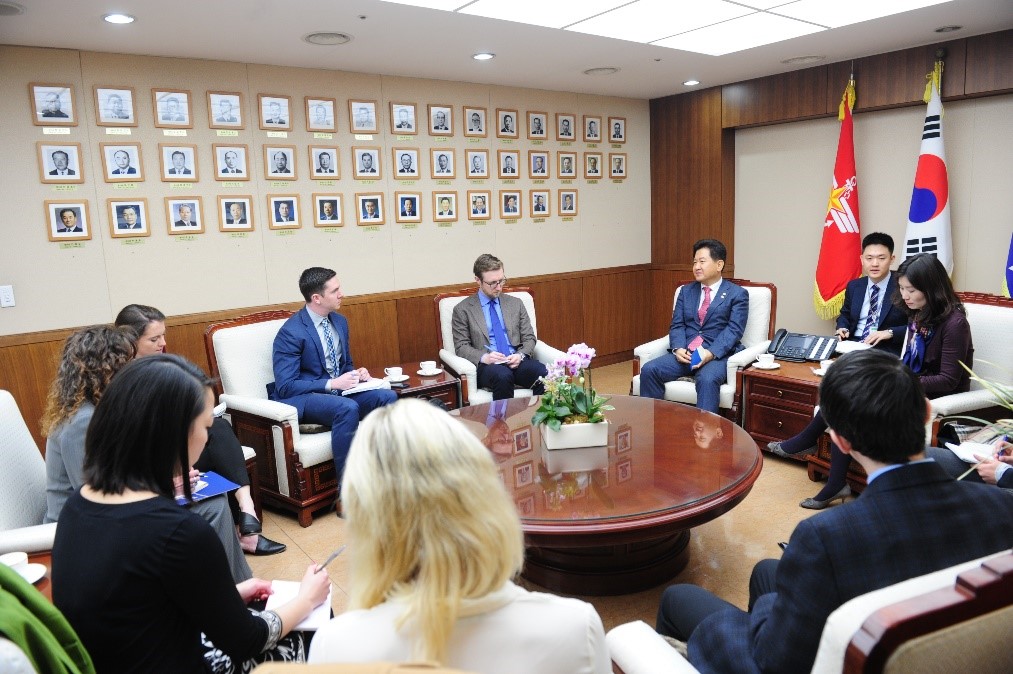
| From April 1-5, the Scowcroft Center for Strategy and Security’s eight US-based Korea Journalist Fellows traveled to Seoul for a trip to increase their understanding of the most critical security and economic issues on the Korean Peninsula. This trip was the highlight of their one-year fellowship, during which they engaged in back-to-back meetings with ministerial level officials from key government agencies, with the US Ambassador to the Republic of Korea, and with the Blue House.
The journalists also paid a visit to the Neutral Nations Supervisory Commission at the Demilitarized Zone to get a hands-on experience of the divide between two countries and how the United States and United Nations are helping to maintain the armistice. Meetings with private-sector representatives from SKT and Hyundai Motors provided them the chance to examine Korea’s private sectors, as well as discuss with its executives current economic and trade issues in Korea. The journalist fellows also held meetings with Chosun Ilbo and JoongAng/JTBC, two major subscription/broadcasting multi-platforms in Korea. Deep-dive discussions with the chairmen and their Korean journalist counterparts helped expose them to a bipartisan picture of Korean politics. |
Nato Engages: The Alliance at 70
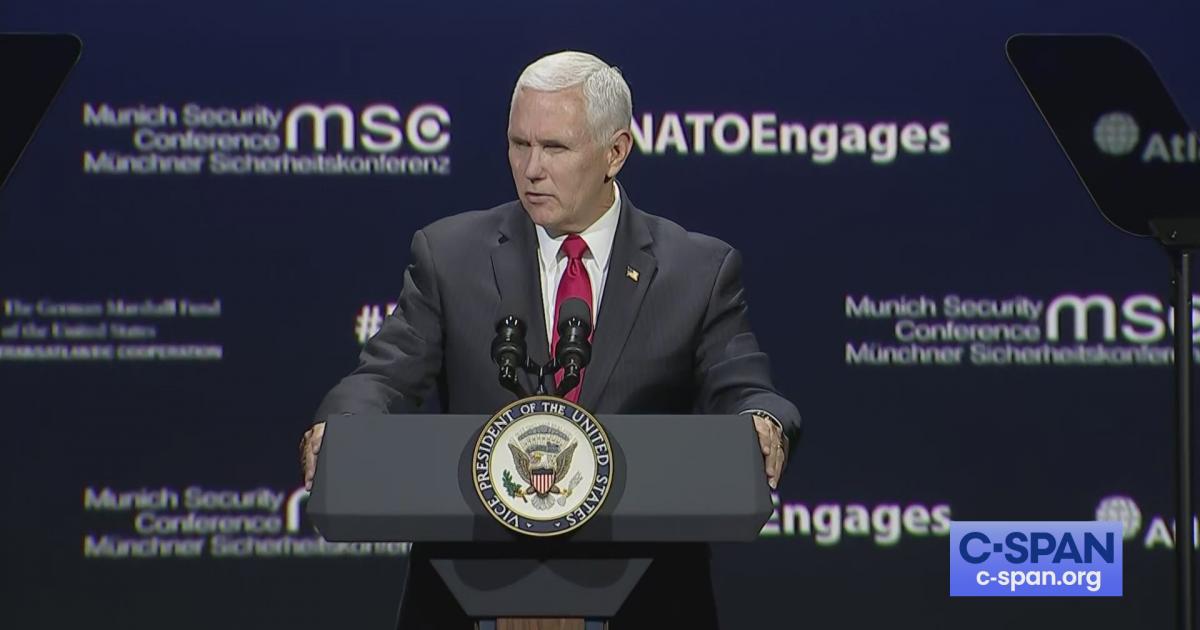
On April 3, the Atlantic Council, the German Marshall Fund, and the Munich Security Conference, in coordination with NATO, hosted NATO Engages: The Alliance at 70, a public town hall event at the Wharf DC. Over 400 speakers and participants from 39 countries took part in this huge public convening. Among the star-studded list of speakers were NATO Secretary General Jens Stoltenberg; United States Vice President Mike Pence; Rose Gottemoeller, Deputy Secretary General of NATO; Former Secretary of State, Madeleine K. Albright, and many others.
In conjunction with NATO ministerial meetings in Washington, the NATO Engages event brought together NATO leaders, European and US officials, foreign policy and defense experts, and next-generation leaders for a day of discussions on the current state of the NATO Alliance around its 70th anniversary. The town hall-style scene-setting encouraged a broader public conversation about the importance of NATO, honored and celebrated its achievements, and discussed NATO’s future at this crucial time for the transatlantic community. There were more than a hundred journalists present, and TV cameras from around the world. The #NATOEngages hashtag reached 33.2 million twitter users, and trended #1 in Washington, DC and nationally.
FUTURE OF EUROPE INITIATIVE
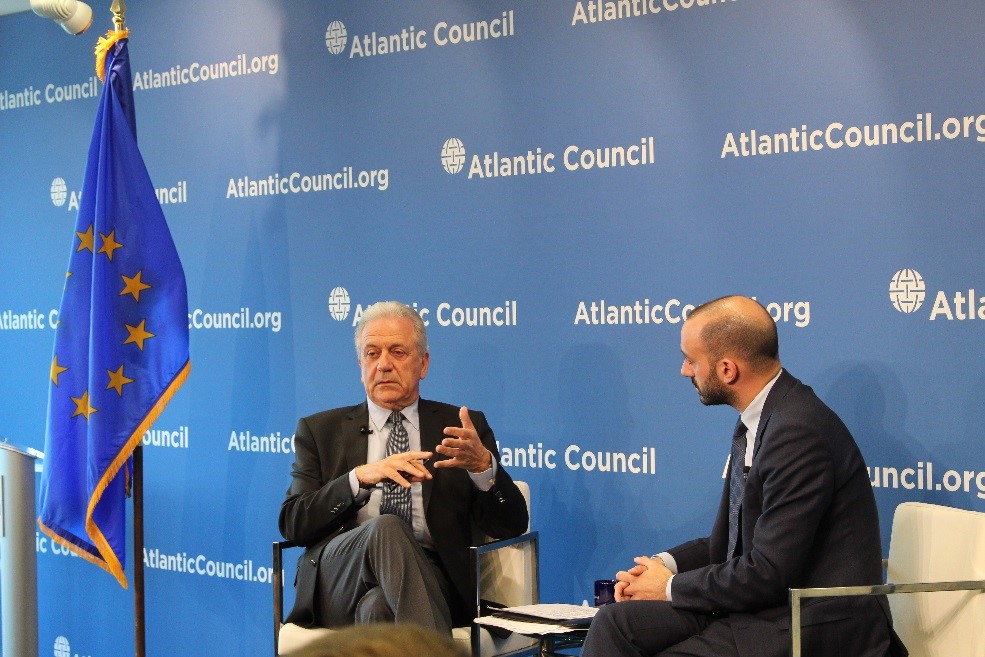
| On April 8, the Future Europe Initiative hosted Mr. Dimitris Avramopoulos, European Commissioner for Migration, Home Affairs and Citizenship at a public event to share the Commission’s perspective and his personal insights on topics such as migration and terrorism in Europe from 2014 onwards. Additionally, he explained the political impact of these trends and outlined EU strategies on managing such global challenges moving forward. |
Private Roundtable with European Commissioner Johannes Hahn
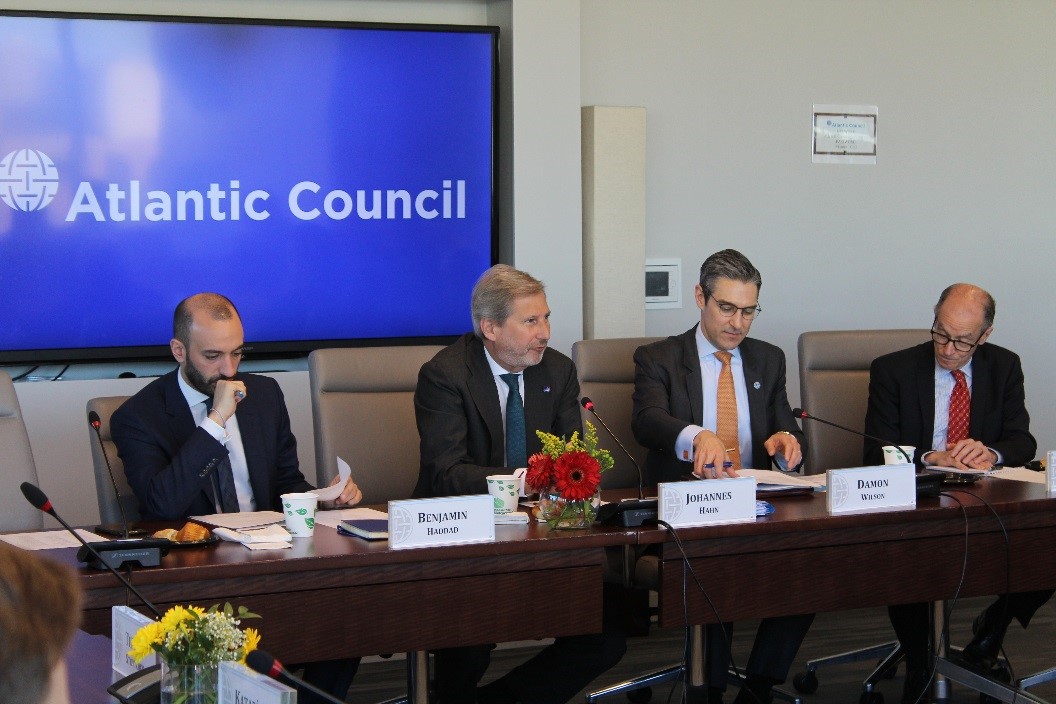
| On April 10, the Future Europe Initiative hosted Dr. Johannes Hahn, European Commissioner for European Neighbourhood Policy and Enlargement Negotiations. Dr. Hahn enlightened the attendees about the adopted European strategy for enhanced engagement and potential enlargement into the Western Balkans region. He also discussed and gave his perspective on recent regional political developments. |
Adrienne Arsht Latin America Center
Venezuela After Maduro: A Vision for the Country’s Future
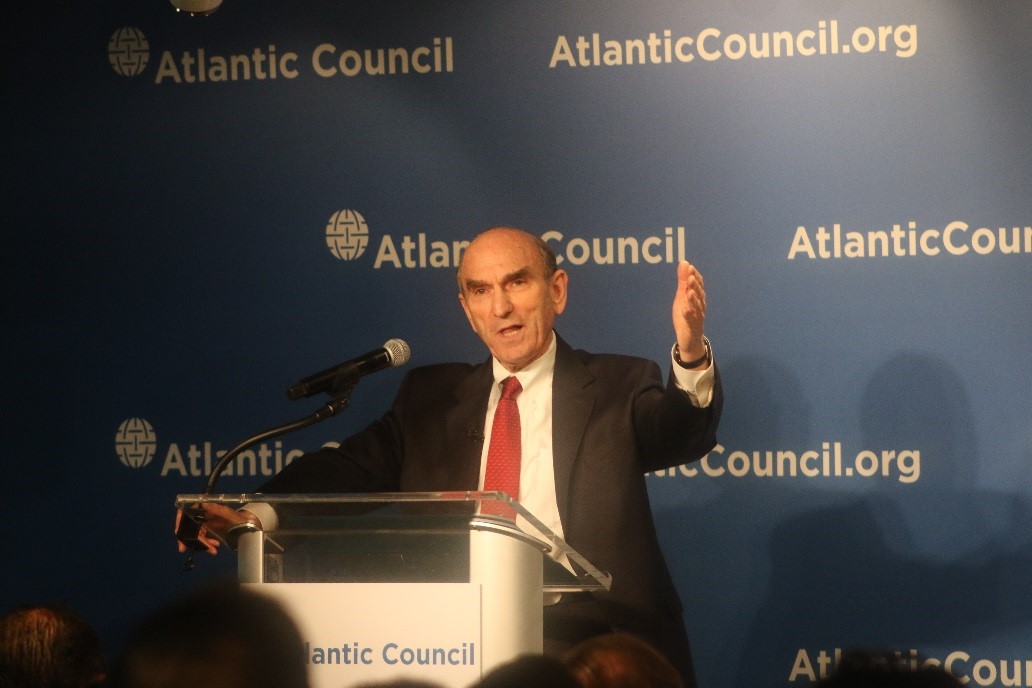
On April 25, the Atlantic Council’s Adrienne Arsht Latin America Center hosted a discussion that laid out a vision for what the future of Venezuela could look like after democracy is restored. US Special Representative for Venezuela Elliott Abrams provided a policy address calling for inclusion to accelerate Venezuela’s democratization process, noting that dissident Chavismo and supporters of Nicolás Maduro’s PSUV [United Socialist Party of Venezuela] party are entitled to a role in rebuilding the country.
Every day that the Maduro regime remains in place, the conditions in Venezuela further deteriorate. But this doesn’t have to be the country’s future. With a democratic transition, reconstruction will bring international funding and assistance to help reclaim the country’s once bright prospects. It will also require a collective effort from Venezuelan leaders across the political spectrum, including dissident voices from democratic actors in the country, and key players from the international community such as multilateral organizations and multinational corporations. This event, which also included a private discussion and a press briefing with Special Representative Abrams, sought to raise awareness around what could be a different future for Venezuela, and how do we get there, and how would this translate into improved lives for the Venezuelan people including the military.
Conference Call: US Foreign Assistance and the Future of the Northern Triangle

On April 2, the Adrienne Arsht Latin America Center of the Atlantic Council held a rapid-reaction conference call following the announcement of President Donald J. Trump’s decision to cut aid to Guatemala, El Salvador, and Honduras, in an attempt to curb Central American migration to the United States. The State Department is now working to end about $700 million in foreign assistance programs for the 2017 and 2018 fiscal years.
As the Atlantic Council’s Northern Triangle Task Force showed, reducing unauthorized migration requires long-term investment in changing the in-country conditions forcing people to migrate. This conference call sought to analyze the impact of the President’s move, assess which programs will be most impacted, and discuss what this means for migration from Central America and the region’s future.
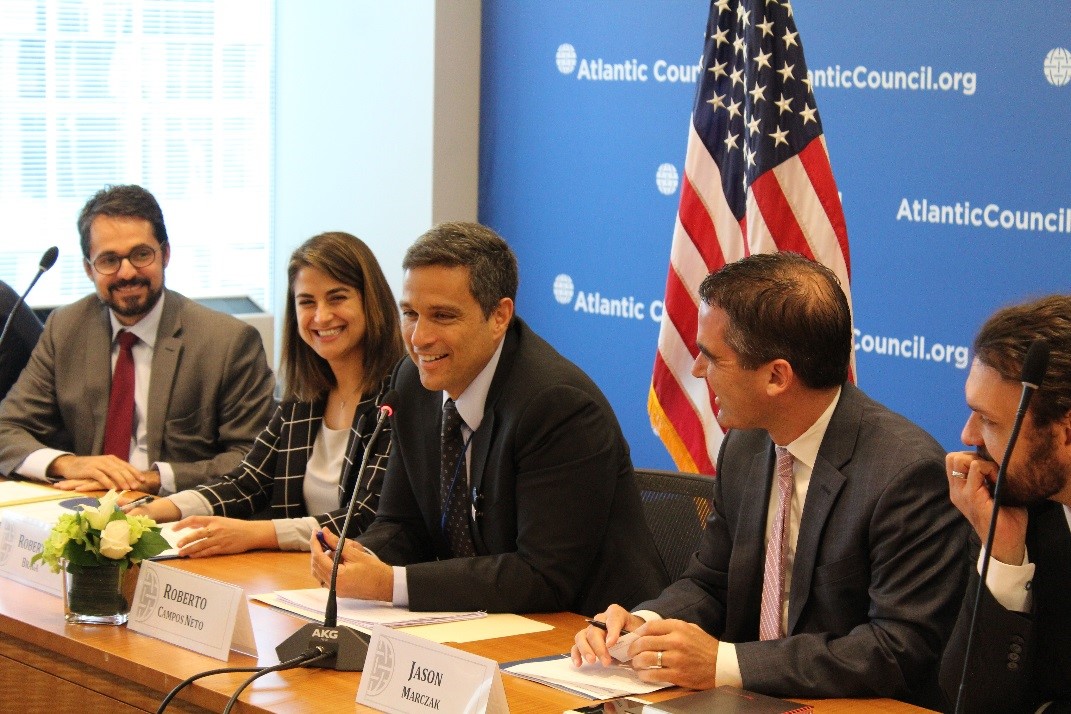
On April 2, the Adrienne Arsht Latin America Center of the Atlantic Council held a rapid-reaction conference call following the announcement of President Donald J. Trump’s decision to cut aid to Guatemala, El Salvador, and Honduras, in an attempt to curb Central American migration to the United States. The State Department is now working to end about $700 million in foreign assistance programs for the 2017 and 2018 fiscal years. As the Atlantic Council’s Northern Triangle Task Force showed, reducing unauthorized migration requires long-term investment in changing the in-country conditions forcing people to migrate. This conference call sought to analyze the impact of the President’s move, assess which programs will be most impacted, and discuss what this means for migration from Central America and the region’s future.
The call, moderated by María Fernanda Pérez Argüello, Associate Director of the Adrienne Arsht Latin America Center of the Atlantic Council, featured María Eugenia Brizuela de Ávila, Co-Chair (El Salvador) of the Atlantic Council’s Northern Triangle Task Force and Former Minister of Foreign Affairs of El Salvador; Robbie Whelan, Foreign Correspondent for Mexico and Central America at The Wall Street Journal; and Jason Marczak, Director of the Adrienne Arsht Latin America Center of the Atlantic Council.

On April 10, Middle East Programs hosted a private roundtable featuring Tunisian Nobel Laureate Ouidad Bouchamaoui. Ms. Bouchamaoui spoke about her experience in the Tunisian revolution, regional developments, and aspirations for her country’s future. Damon Wilson served as moderator for the discussion, which addressed how the conflict in Libya impacts Tunisia’s security, upcoming presidential and parliamentary elections, and Tunisia’s role in the Middle East.
Workshop on the Future of Northeast Syria
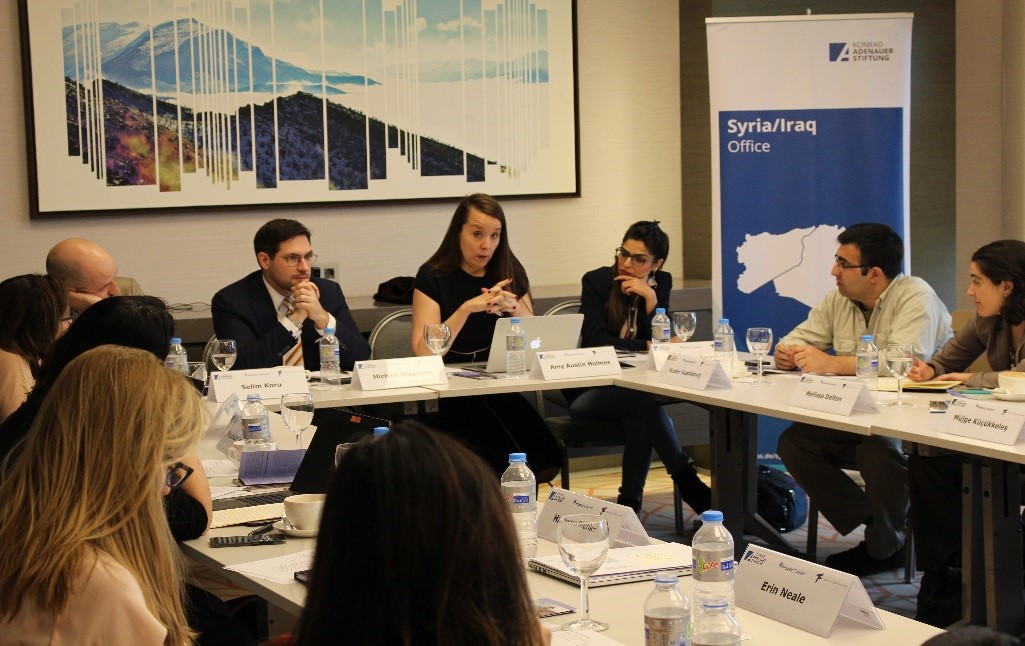
From April 15-17, Middle East Programs, along with former Resident Senior Fellow Aaron Stein (now Director of the Foreign Policy Research Institute), hosted a conference on the future of Northeast Syria in Erbil, Iraqi Kurdistan. Participants addressed the future stability of Syria’s northeast through the lens of governance, political reconciliation, and external actors. Assistant Director Emily Burchfield and Aaron Stein are drafting a Report on the workshop to be published by the Council in partnership with the Foreign Policy Research Institute and the Konrad-Adenauer-Stiftung, which funded the project.
AFRICA CENTER
Congolese President Discusses Strategic Partnership with the United States

On April 4, the Africa Center hosted H.E. Félix Tshisekedi Tshilombo, president of the Democratic Republic of the Congo (DRC), during his first official visit to the United States.
For an audience of senior US policy makers and non-profit representatives, President Tshisekedi discussed his country’s relationship with the United States. In particular, he hoped to form a strategic partnership with the United States that would promote peace and security, the rule of law, and economic development in the DRC. He also sought US assistance to fight the emerging threat posed by ISIS in his country. Participants had the opportunity to engage the new president on the conditions of his election and his ability to enact his ambitious reform agenda.
Private Consultation on Prosper Africa

On April 9, the Africa Center hosted senior US government officials to discuss “Prosper Africa,” a key pillar of the Trump Administration’s Africa Strategy.
This convening briefed senior US government and private sector stakeholders on how the Prosper Africa initiative will support US investment across the continent, accelerate the growth of Africa’s middle class, and counter Russia and China’s growing economic footprint. Participants had the opportunity to directly address key policy makers at an early stage of Prosper Arica’s development, raising key issues that need to be addressed in order to successfully promote US private sector engagement in Africa.
See more about the Africa Center
EURASIA CENTER

| On April 1, the Eurasia Center hosted a public event discussing the first round of the Ukrainian presidential elections. The 2019 presidential election has been a pivotal event in Ukraine’s history. Anticipating attempts at outside interference in the election, the Atlantic Council, the Victor Pinchuk Foundation, and the Transatlantic Commission on Election Integrity established a Ukrainian Election Task Force. At this event, experts analyzed the results of the first round elections, and members of the task force summarized their findings on interference efforts. Speakers included Carl Gershman, president of NED; Nataliya Bugayova of the Institute for the Study of War; David Kramer, senior fellow with Florida International University; Laura Galante, Atlantic Council senior fellow; and Oleksiy Melnyk of the Razumkov Centre. |
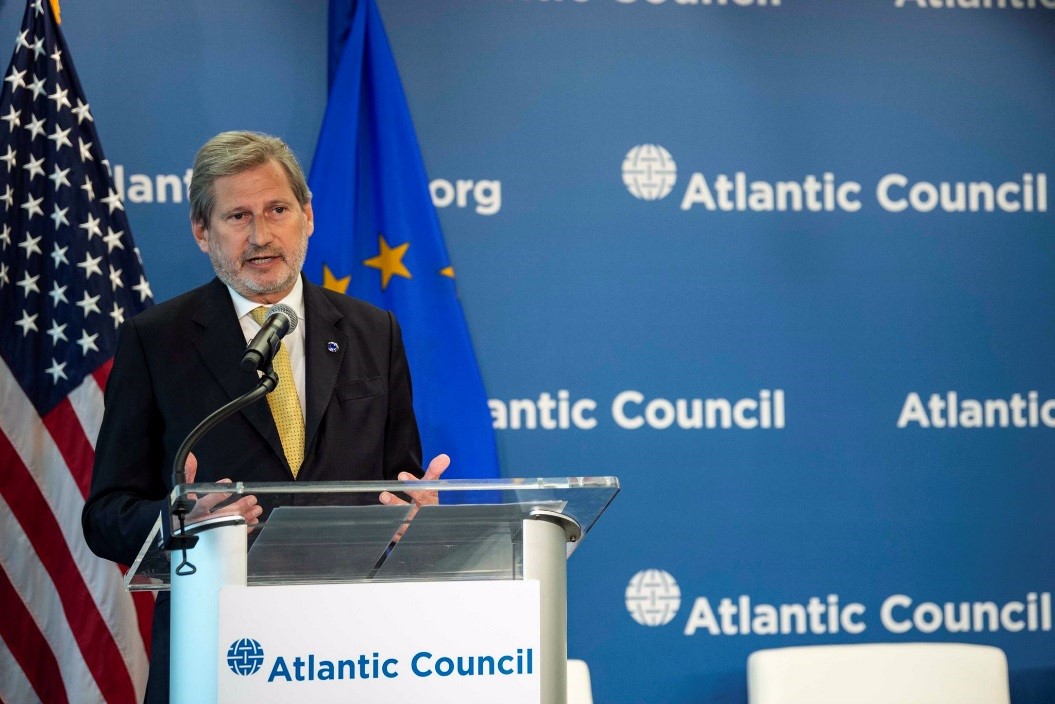 On April 11, the Eurasia Center, together with the European Commission, hosted a public event on the occasion of the visit of Commissioner Johannes Hahn and the tenth anniversary of the EU Eastern Partnership. The Eastern Partnership is a joint initiative involving the European Union, its Member States, and six Eastern European Partners: Armenia, Azerbaijan, Belarus, Georgia, the Republic of Moldova, and Ukraine. This event featured keynote remarks by Commissioner Johannes Hahn and Minister of Public Finance of Romania Eugen Orlando Teodorovici, along with panel discussions with representatives of the six Eastern Partnership countries. The conversation focused on recent progress in strengthening economies and improving governance as well as the challenges ahead. |
See more about the Eurasia Center
GLOBAL BUSINESS & ECONOMICS
In the context of the spring meetings of the International Monetary Fund and the world Bank Group, the Atlantic Council’s Global Business & Economics Program (GBE) and the Future Europe Initiative (FEI) co-hosted The Hon. Valdis Dombrovskis, Vice President of the European Commission for the Euro. The discussion held on April 12th centered on the state of the European Union and ongoing Brexit negotiations. Commissioner Dombrovskis addresses the implications of the decision to extend the deadline for the United Kingdom’s withdrawal from the EU, including political and financial repercussions.
The event was live- streamed by C-SPAN. GBE Director Bart Oosterveld opened the event, which was moderated by Dr. Alexis Crow, Nonresident Senior Fellow with the Atlantic Council’s Global Business & Economics Program.
Financial Inclusion to Financial Sustainability – Empowering Women in South Asia and Across the World
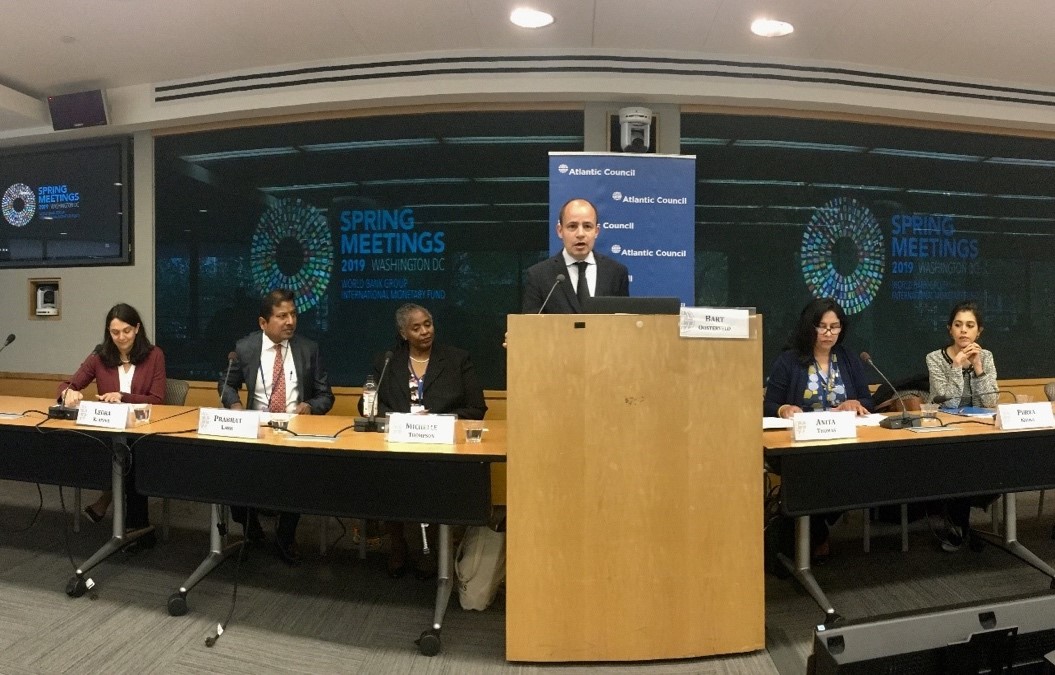
On April 11th, the Atlantic Council’s Global Business & Economics Program (GBE) and the South Asia Center (SAC) partnered with the Grameen Foundation India and the NGO Committee on Financial for Development to host a panel discussion as part of the World Bank’s Civil Society Policy Forum Spring 2019.
The event was part of GBE’s Inclusive Growth Initiative and addressed the challenges women face in becoming financially independent as well as analyzed the tools to empower them. GBE Director Bart Oosterveld noted the urgency of the topic and introduced speakers Ms. Anita Thomas, Chair of the NGO Committee on Financing for Development, Mr. Prabhat Labh, CEO of Grameen Foundation India, Dr. Michelle Thompson, Data Fellow at the Mastercard Center for Inclusive Growth, Dr. Purva Khera, Economist at the Monetary and Capital Markets Department of the International Monetary Fund, and Dr. Leora Klapper, Lead Economist of Finance and Private Sector Development at the World Bank Group.
See more about the Global Business & Economics Program
Millennium Leadership Program
| On April 3rd, a cohort of Millennium Fellows had the opportunity to attend and participate during NATO Engages. Zafar Hashemi shared his history with NATO beginning as a boy in Afghanistan and culminating in his current position with SIGAR. Pete Seat was asked to present his perspective immediately following Secretary General Jens Stoltenberg’s address to the joint session of Congress. 2018 Fellows Aiko Shimizu and Iskander Akylbayev and 2016 Fellow Mohammed Ghanem were also in attendance. |
DIGITAL FORENSIC RESEARCH LAB
| On April 2, Emerson Brooking gave a lecture on the “Weaponization of Social Media” with elements from across the Canadian Department of Defense. Public diplomacy and intelligence services were well-represented. He also participated in a roundtable with the Assistant Deputy Minister Public Affairs ADM(PA), which administers most social media/public diplomacy initiatives on behalf of Canadian Armed Forces as well as one with the Assistant Deputy Minister of Information Management ADM(IM). |
| Briefing for the French Presidency on Disinformation |
| On April 26, Ben Nimmo provided a briefing to 16 officials from rgw French presidency, Ministry of Foreign Affairs, the air force, military academy, Justice Ministry, and Interior Ministry on disinformation and electoral interference. The officials were especially concerned about Chinese influence, especially in French-speaking Africa, and were interested in what the emerging threats are with regards to disinformation in the region. |
Briefs & Blogs
A Strong NATO Could Help Alleviate the World’s Migrant and Refugee Crisis
Priyali Sur
2017 Millennium Fellow Priyali Sur penned a New Atlanticist post in the wake of NATO Engages about the impact of NATO on the world refugee crisis. Building on the success of her nonprofit startup, The Azadi Project, Ms. Sur continues her advocacy on behalf of those who suffer the most during crises of displacement.
Agriculture Hurdle Could be Insurmountable for US, EU Negotiators
Marie Kasperek
For roughly 14 years, the political bloc and America have fought over subsidies to aviation giants Boeing (a US company) and Airbus (a European company). In 2004, Washington accused four European countries of providing illegal subsidies to Airbus, which in turn would allow the company to sell their products at a lower price point…In 2005, Airbus retaliated by saying that Boeing had received nearly $20 billion in public subsidies over a period of two decades…“It’s kids in the sandbox hitting each other with shovels,” says Marie Kasperek, an expert on transatlantic business at the Atlantic Council, a think tank in Washington, DC.
Get the USMCA Done To Preserve Over 30 Years of Prospertiy
Amb. Earl Anthony Wayne
“Given the enormous economic benefits of sustaining North America’s commercial networks, Congress, the Trump administration and the non-governmental stakeholders should make every effort to find an approach that addresses key concerns raised, approves USMCA and produces a mutual “win” for the three countries this year.”
The Spark that Launched Brexit Has Returned and Could Torpedo Compromise
Barbara Matthews
| The Atlantic Council’s Global Business & Economics Program’s nonresident senior fellow Barbara Matthews offered her preview of the European Council summit and the G-20 side discussions alongside the IMF and World Bank spring meetings in a blog post for the New Atlanticist.
US-Japan Trade Negotiations: A Narrow Scope is Key to Success
|
In the News
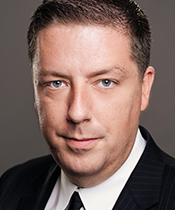 Chris Porter, Nonresident Senior Fellow, The Scowcroft Center for Strategy and Security -The Hill
Chris Porter, Nonresident Senior Fellow, The Scowcroft Center for Strategy and Security -The Hill The White House has rolled out a new National Cyber Strategy and the Pentagon has implemented a complementary Defense Cyber Strategy. Between the two documents and other official public announcements from the military and intelligence community, three key themes emerge: A newfound bias toward action in cyberspace to counter adversaries’ cyber operations, an emphasis on threats to the U.S. economy as the preeminent national security threat caused by those cyber operations, and a tougher approach to securing the supply chain on which the U.S. military and civilian critical infrastructure rely.”
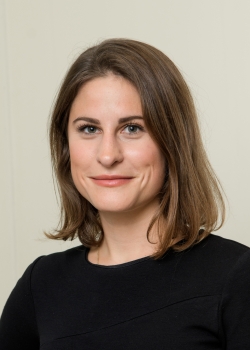 Ms. Sophia Besch, Nonresident Senior Fellow, Future Europe Initiative – Politico.eu
Ms. Sophia Besch, Nonresident Senior Fellow, Future Europe Initiative – Politico.eu
If NATO is to survive the coming decade it has to adapt to two big trends that are redrawing the transatlantic relationship. The first is Europe’s push to become more militarily self-sufficient. Washington wants Europe to look after itself, invest in its territorial defense capabilities vis-à-vis Russia and take on more responsibility for its neighborhood in the Middle East and North Africa. But it is also wary of Europe’s drive for “strategic autonomy” as it might mean Europeans buying less American military kits.
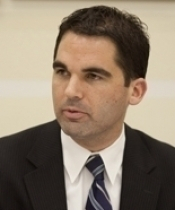 Jason Marczak and Diego Area, Adrienne Arsht Latin America Center – The Hill
Jason Marczak and Diego Area, Adrienne Arsht Latin America Center – The Hill
“It’s time to accept that the current stalemate requires a tweak in strategy. That is: A peaceful transition to democracy requires broadening the umbrella of those seeking to oust Maduro and clamoring for a return to political and economic stability. That means reaching out to dissident Chavistas and building an inclusive process that has a future for them and the military.”
 Barbara Slavin, Director and Nonresident Senior Fellow, Future of Iran Initiative – National Public Radio
Barbara Slavin, Director and Nonresident Senior Fellow, Future of Iran Initiative – National Public Radio“I think the real concern is that Iran, deprived of oil revenues despite the fact that it is complying with the nuclear agreement, might actually pull out of that agreement and start accelerating its nuclear program again. The logic behind the administration move frankly still mystifies me because had the United States remained within the agreement, it could have tried to negotiate with Iran and with other countries on other issues that are of concern to the United States. Instead, by withdrawing from the agreement and re-imposing sanctions, what the U.S. has done has created a great deal of enmity with many of our allies…So a year later, the U.S. policy is showing no signs of success – so what do they do? They double down and now insist that no oil can be exported by Iran to the rest of the world.”
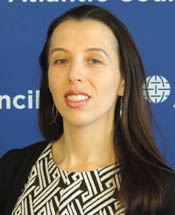 Aubrey Hruby, Senior Fellow, Africa Center- Financial Times
Aubrey Hruby, Senior Fellow, Africa Center- Financial Times“While, by mandate, the new US International Development Finance Corporation must operate internationally, it must also embrace a domestic imperative to actively mobilize institutional capital and better support US investors who venture into new markets.”
“Although the new Trump policies may increase pressure on the Cuban regime, the negative impact on the Cuban people will be far greater. Further, these policies are certain to generate tensinos with U.S. allies and prove a distraction as the U.S. seeks to increase pressure on the Maduro regime, where the chances of success are far greater.”
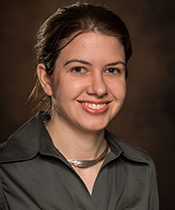 Melinda Haring, Editor, Ukraine Alert, Eurasia Center – Foreign Affairs
Melinda Haring, Editor, Ukraine Alert, Eurasia Center – Foreign Affairs“The vote was a referendum on Poroshenko, who was elected on an anti-graft platform following the 2013–14 Euromaidan protests that resulted in the ouster of President Viktor Yanukovych. Ukrainians have told pollsters they are frustrated with the country’s lack of progress over the last five years. People’s everyday lives haven’t gotten better, none of the prominent crooked officials from the pre-Euromaidan era were imprisoned, and the war with Russian-led separatists in the country’s east remains at a stalemate. The war, corruption, and the economy were the top issues for voters.”
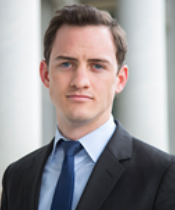 Graham Brookie, Director, Digital Forensic Research Lab – New York Times
Graham Brookie, Director, Digital Forensic Research Lab – New York Times
| “The Indian elections in 2019 are an important test case for how they get 2020 right, and how they get elections right everywhere going forward”, said Graham Brookie, director of the Digital Forensic Research Lab at the Atlantic Council, a think tank working with Facebook to study disinformation campaigns. |
Publications
Pakistan Army’s Covert Social Network
Kanishk Karan and Ben Nimmo
Individuals linked to the Pakistan Army’s public-relations division ran a network of covert Facebook and Instagram pages, which inflamed tensions over India, pushed Pakistan’s claims over Kashmir, and praised the army itself, until Facebook removed the pages on April 1. The network of more than 100 pages, accounts and groups represented a significant influence operation, apparently aimed at boosting support for the army inside Pakistan and boosting support for Pakistan abroad.
Missile Strikes Hit Near Masyaf and Homs
Lukas Andriukaitis
A series of missile strikes on April 12 inside Syria was attributed to Israel, despite no direct acknowledgment from the Israeli military. The attacks targeted a Syrian military base, with alleged ties to the Iranian regime, in the Masyaf region of northern Syria.
Two days after the attack on April 14, the first reports of the strikes with accompanying satellite imagery appeared on i24News and Telesur. These initial reports attributed the strikes to Israel. On the same day, Israeli Prime Minister Benjamin Netanyahu insinuated that Israel might have been responsible for the strikes. He said, “[Israel] is continuing to operate on all fronts, including the northern one.” Soon after Netanyahu’s statement, social-media users suggested that additional strikes occurred that day but were ignored by news media outlets
Cybersecurity: Changing the Model
Franklin D. Kramer and Robert J. Butler
The current model of cybersecurity is outdated. Adversaries continue to grow more sophisticated and outpace advancements in defense technologies, processes, and education. As nation states enter into a new period of great power competition, the deficiencies in current cybersecurity practice, evidenced by the growing number of successful cyber-attacks from Russia, China, North Korea, and others, pose a greater threat. The need to update the cybersecurity model is clear. An enhanced public-private model – based on coordinated, advanced protection and resilience – is necessary to protect key critical infrastructure sectors. In addition, enhanced action from the federal government, coupled with increased formal cooperation with international allies, are necessary to ensure comprehensive cybersecurity resilience.
William Greenwalt
In US law, the National Technology and Industrial Base (NTIB) comprises the industrial bases of the United States and three of its closest historical allies, Australia, Canada, and the United Kingdom. That recent expansion has corresponded with a changing threat and technology environment, in which the leading sources of industrial innovation reside outside the defense sector and, increasingly, beyond the US and its Western allies. This new threat and technology environment will require a different type of NTIB to support future defense-industrial planning and execution. The purpose of this new Atlantic Council report is to promote urgent deliberations over what a modern NTIB should look like, and to encourage Congress and the administration to adopt measures that will enable access to defense-industrial resources that are more responsive to the needs of the National Defense Strategy.
NATO at Seventy: Filling NATO’s Critical Defense-Capability Gaps
Wayne A. Schroeder
| As NATO reaches its seventieth anniversary in 2019, the Alliance is facing new challenges both externally and internally. The reemergence of Russia as a strategic threat has led to the reexamination of NATO’s warfighting capabilities and the gaps that exist to adequately defend and deter. At the same time, both renewed US focus and the emergence of new security threats have placed increased pressure on member states to reach established spending targets. The need to outfit and equip NATO for great power competition, as well as increased pressure to invest more in defense, provides an opportunity to strengthen NATO for the future. Yet the path forward is still unclear. What investments should be prioritized in the land, air, maritime, space and cyber domains? And how should the Alliance’s nuclear deterrent be modernized?
Ecology Meets Geopolitics As the rivers produced by the Himalayas and other mountain ranges on the Plateau are under increasingly serious pressure, water insecurity threatens much of the continent’s peace and security. This report focuses on the intersection between Himalayan Asia’s changing ecology and the dynamic competition for geopolitical leadership among its major powers. It seeks to better inform US strategies and policies to preclude the degradation of societal cohesion across Asia and prevent the outbreak of major-power conflict over shared water resources. The goal is to facilitate cooperative, positive-sum solutions to resource use in this critical region of the world. Dealing with the Offshore Economy Most of the public critique of the Western offshore economy so far has focused on the large loss of tax revenue to OECD states through the use of havens by major corporations and individuals. However, in fact the greatest danger posed by the offshore economy is not a financial threat, but a security one. In his new report, Dr. Alan Riley explains how offshore and business practices threaten the West, and how Western democracies should deal with them.
|
